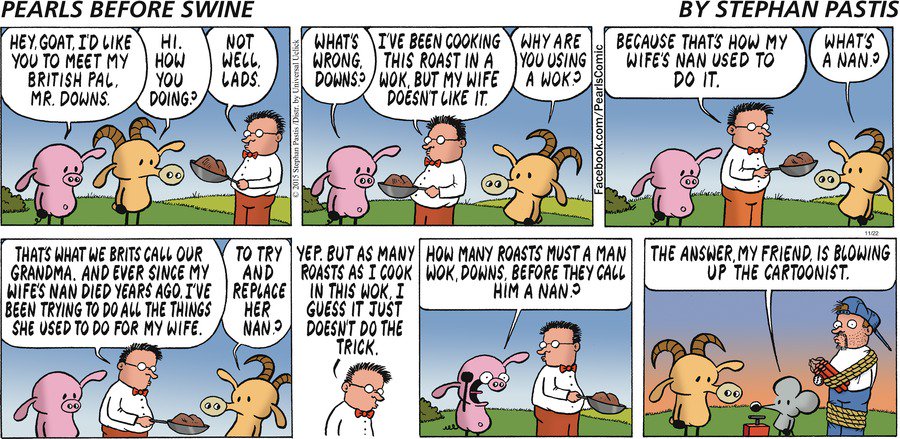Two Ways to do a Pun
I was going to continue with serious lessons, but today I ran into two comics that are not only both on the same topic, but they illustrate one of the finer points of punning.
Type 1: When the pronunciation of the misused words is the same,
https://comicskingdom.com/crankshaft/2017-07-13
Type 2: When the pronunciation is almost the same,
https://comicskingdom.com/take-it-from-the-tinkersons/2017-07-13
Which reminds me of my sister’s favorite pun, which goes something like this: “I thought that was water dripping from your nose, but it’s not.”
She has a fiendish laugh to go with it.
Subscribe to this blog's RSS feed
Two Kinds of Puns
Several people have been credited with saying that puns are the lowest form of humor, but I suspect that’s because they couldn’t think of any themselves. Anyway, exact homonyms, words spelled differently but pronounced the same, are the fodder for the good kind of pun; slightly mispronounced words make the other kind of pun. Here’s a comic (Soup to Nutz) from January 11 with the good kind:
Stephan Pastis, he of Pearls before Swine is pretty good at producing the other kind. That’s him wrapped with dynamite.

A Figure of Speech
Some time ago I mentioned synechdoche. It’s when you mention part of something to refer to all of it. For instance, cattlemen say “forty head of cattle.” They’re not counting trophies in their parlor. Synechdoche also works in reverse, when you mention the whole thing but mean only a part. You might mention a city, for example, when you really mean only its professional athletic team. Something like “Chicago won the World Series.” By the way, synecdoche is pronounced sin-ek-duck-ee.
Both of these are special cases of a more general figure of speech, metonymy, when you mention something but mean something related to it. They don’t necessarily have to be part or the whole. This comic, from April 4, 2016 reminded me of metonymy:
Old Bill and his writings are two completely different things. Metonomy. I’m so used to referring to a (famous) person’s writings by the person’s name that I hadn’t thought of it as a figure of speech. So I thought I’d share it with you. Frank and Ernest, by the way, is an excellent comic if you like puns and malaprops.
For the finalé, here’s a line I grabbed from the Los Angeles Times. It contains two synecdoches. Can you find both?
Connecticut defeated Syracuse, 82-51, in the NCAA championship game Tuesday in Indianapolis for its fourth consecutive NCAA title.
Why isn’t “Indianapolis” a synecdoche?
Grammar in comics
I seem to be on a comics jag lately. As it happens, comic writers generally have a pretty good grasp of English, and they have well-developed senses of humor, so I suppose comics are naturally a fertile field for humorous references to our language. Here are two more.
Bob Thaves, he of Frank and Ernest, is the consummate master of the egregiously wonderful pun. (Yes, “egregiously wonderful” is an oxymoron, at least when applied to puns. The better the pun, the bigger the groan.) You really should bookmark or get an RSS feed to this strip.
This one is from an absurdist strip I found recently, named Hubert and Abby. It happens to mention a word that if you get it wrong, you betray serious illiteracy. (And if you got that sentence on the first try, you are definitely not illiterate.)




